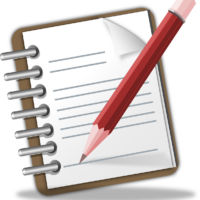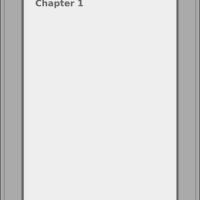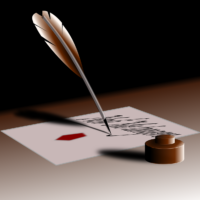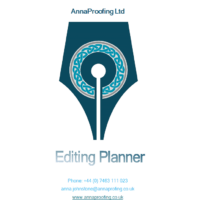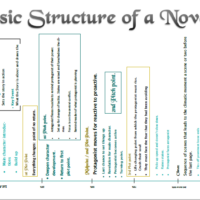
by Anna Johnstone | May 16, 2019 | Advice, Blog
Sorry for the hiatus in my content, I have been extremely busy with editing and it has not allowed time for creating content, and I spent the first two weeks of April visiting family in Zimbabwe. Don’t worry: I won’t bore you with my holiday photos.
This post has something for everyone. There are links to some great advice as well as some interesting news from PRH who plan to reward readers for their loyalty. I’ve also included some great book suggestions.
Articles
Penguin Random House in the US has launched a ‘Reader Rewards Loyalty Program’, a free promotional initiative that lets readers earn one free book for every 12 PRH titles they purchase.
5 Secrets of Story Structure: How to Write a Novel That Stands Out (Helping Writers Become Authors Book 6)
by K. M. Weiland
Want to take your writing to the next level? Discover the “secrets” of story structure other authors are overlooking!
If you’ve read all the books on story structure and concluded there has to be more to it than just three acts and a couple of plot points, then you’re absolutely right! It’s time to notch up your writing education from “basic” to “black belt.” Internationally-published author K.M. Weiland shares five “secret” techniques of advanced story structure.
In the multi-award-winning Structuring Your Novel, Weiland showed writers how to use a strong three-act structure to build a story with the greatest possible impact on readers. Now it’s time to take that knowledge to the next level.
In this supplemental book, you’ll learn:
-
- Why the Inciting Event isn’t what you’ve always thought it is
-
- What your Key Event is and how to stop putting it in the wrong scene
-
- How to identify your Pinch Points—and why they can make the middle of your book easier to write
-
- How to create the perfect Moment of Truth to move your protagonist from reaction to action
-
- How to ace your story’s Climactic Moment every single time
And much more!
By the time you’ve finished this quick read, you’ll know more about story structure than the vast majority of aspiring authors will ever know—and you’ll be ready to write an amazing novel that stands above the crowd.
Outline Your Novel
by K. M. Weiland
Can Outlining Help You Write a Better Story? Writers often look upon outlines with fear and trembling. But when properly understood and correctly wielded, the outline is one of the most powerful weapons in a writer’s arsenal.Outlining Your Novel: Map Your Way to Success will:•Help you choose the right type of outline for you•Guide you in brainstorming plot ideas•Aid you in discovering your characters•Show you how to structure your scenes•Explain how to format your finished outline•Instruct you in how to use your outline•Reveal the benefits•Dispel the misconceptions include exclusive interviews with ten respected authors, answering important questions about outlining. Outlining can organize your writing and help you take your stories to the next level. Find out how!
Edit Ready: How to make your book as good as you can, before you send it to an editor.
By Harry Dewulf
Edit Ready is an author’s reference book for use during story development, writing and both self editing and when you get your manuscript back from your editor.
Put like that, it sounds rather dry, but reference books always do.
Actually, though, although it has an exhaustive contents page, three different indices and 6 appendices, this is not a dry reference book. In fact, the ink is never dry for long.
Because Edit Ready is compiled from notes, guidance, teaching and conversation with authors, while working with them to make their manuscripts as good as they can, but also, to help them to become better authors.
Every time I edit a book, I look at the topics that arise, and try to find a way of generalizing the help and advice I give to its author, so that I can pass the advice on to all authors.
So really, Edit Ready is an attempt to avoid editing, by ensuring you know in advance about anything and everything that your editor has to deal with. The idea is that this will make you a better writer.
Speaker for the Dead
by Orson Scott Card
A FALLEN HERO – HAUNTED BY HIS PAST, BUT CAN HE CHANGE THE FUTURE?
Ender Wiggin was once considered a great military leader, a saviour for mankind.
But now history judges his destruction of an alien race as monstrous rather than heroic.
In the aftermath of the war, Ender disappeared, and a powerful voice arose: The Speaker for the Dead, who told the true story behind the battle with the aliens. Now, years later, a second alien race has been discovered. But again they are strange and frightening – and again, humans are dying.
It is only the Speaker for the Dead, secretly Ender Wiggin, who has the courage to confront the mystery . . . and the truth.
The Hugo and Nebula award-winning sequel to the classic science fiction novel Ender’s Game
Broken Empire
By E. A. Copen
In an empire where political power is everything, Captain Timothy Val wants one thing: to serve his empire with honor and distinction. But after a mission to quell a revolt goes terribly wrong, Timothy is branded a traitor and barely escapes with his life. His only hope of regaining his lost honor and clearing his family name rests in the hands of a senator planning to use him as the face of a revolution.
With an intergalactic war looming and civil unrest spreading through the empire, Timothy must tread carefully. Assassins wait around every corner, and his new allies have made him powerful enemies, enemies that may not be entirely human.

by Anna Johnstone | Jan 27, 2018 | Blog, Own Writing
For those who don’t already know, I spent most of 2017 writing and editing my own first book. It’s already available in paperback, but now it’s ready and available in e-book format from Kindle, Barnes and Noble, Kobo, and iBooks. This is why I haven’t had much time to blog on this site, but hopefully, I will have more time once I get the promo-out of the way.
Charon was once the Ferryman of the Underworld. Now he’s the doorman of a disused office block. If only the old Gods hadn’t lost that drunken bet all those centuries ago, things would be very different. For a start, Ragnarök probably wouldn’t be on its way.
Ra is looking for a way of escaping the mortal realm, but there’s something about his plans he isn’t telling everyone.
Maybe Charon is the only one who’s noticed. He certainly seems to be the only one who cares. But can he do anything about it? It looks like he’s going to try. But there are others who might profit from the situation, and the last thing he wants is the Fae Courts breathing down his neck.
(more…)

by Anna Johnstone | Nov 28, 2017 | Advice, Blog, Service
A sample edit is an indicator of many things; the professionalism and ability of the editor is only one factor. The sample indicates the level of the work to be undertaken and it allows the editor to asses pricing but did you realise it also shows the editor the level of respect they hold for the skills of the editor?
These did not develop overnight and it is not something that just everyone can do. In the last fourteen months, I have lost count of the number of sample edits I have completed. Some of them took me a whole morning and others took me the best part of a day, depending on the amount of work that needed to be done.
‘But why should authors pay for what they can get for nothing?‘
The reason to pay for samples is two-fold.
First. Refusal to pay for sample edits signal, at least in part, an expectation that editors are automatically obligated to give up their time, and should be grateful for every scrap of attention an author puts their way. Given that this is an attitude that many of us in the creative industries have to explain when companies and individuals want to pay us in ‘exposure’ and think that the satisfaction of completing the work should be its own reward, it saddens me when we have to deal with this from other creatives. The willingness of an author to pay for a sample edit is a clear indication that they acknowledge that your time is as valuable as the skills they want to employ. It says ‘I understand there is a person at the other end of this email who is working hard to make a living, and they deserve to be paid fairly for the work they put in‘. It tells the editor a great deal about the author: remember they are assessing the author every bit as much as the author is evaluating them. Simply put, it’s a matter showing respect between author and editor.
Second. Many service industries charge a call out fee to cover the time it takes them to assess the work in question, and a sample edit is no different. You would not expect a plumber, cleaner, gardener or electrician to come to your home or to give up a morning of their time for nothing. In my view, creative services are no different. The sample fee implies the level of commitment of that potential client. Even web developers charge a consultation fee, This is not to say that editors should not offer free samples if they so wish, only that you should not be put off when editors do charge for their sample edits. By ignoring the editors who don’t offer free samples you could be depriving yourself of an opportunity. What you have found is not a ‘greedy editor‘, but a confident and skilled professional who knows the value of both their skills and their time.
by Anna Johnstone | Sep 14, 2017 | Blog, Service
Here it is!
I’ve now closed down the old editing blog and copied my posts across so I am only managing one website. This site allows you to send enquiries, view prices and services, as well as read news and advice on writing, editing and self-publishing, all in one place.
It also allows you to post testimonials and reviews of my service. Feel free to have a click around and explore and do let me know what you think.
by | Apr 7, 2017 | Advice, Blog
Proofreading and copyediting, while not nearly as entertaining as the writing process to some (a lot of us quite enjoy it), is still important. For many authors who don’t outline editing is a chance to iron out plot holes and check character arcs. For others, it’s a chance to flesh out some parts you might rush through just to finally finish creating the bones of the story but that’s the bigger picture. This post covers some of the reasons why DIY editing, is not always a good idea. There is no substitute for properly and carefully checking your own work for errors or, if the mere idea of proofreading sends you straight to the Land of Nod, hiring someone like me.
1. It won’t catch caption errors, transpositions, inconsistent formatting or repeated text.
There is no way around it. So long as you’ve spelled each individual word correctly, it will not bring it up. The red and blue squiggly things in Word are a guide but they are only as reliable as to human being who programmed them. A spellcheck is set to look for individual words but it doesn’t always see them in context. Typing ‘form’ instead of ‘from’ won’t be picked up as an error. A spell checker is no substitute for knowing the rules of grammar and punctuation. How will you know if the suggested change is correct if you don’t understand how commas work in the first place. You’ll never catch every mistake on your own, but you have a good chance of creating some new ones if you rely solely on the automatic functions of your word processor.
2. Proofreading is more than a manual spell-check.
This is the last stage of editing prior to publication. It’s vital not to leave this stage to chance. It allows you to look for colour variations, layout issues, spacing, typeface consistency, missing items, tense and tone errors, content errors, inconsistent capitalisation, that page numbers are correct, and other formatting problems. In short, this is your polish. No matter the content, presentation matters and sloppy presentation will come back to haunt you.
3. It can’t check for flow, or that the language style suits your audience.
It won’t be able to tell whether your content delivers the content promised in the title. Does the writing style of the meet their expectations? Are the facts correct? If it’s an academic work, are those facts supported by cited evidence? If my spellchecker had been able to check references, I would have had a lot fewer headaches while I was studying for my degree but I would have still checked them for errors myself.
4. It cannot fact-check.
Given enough time to do their homework, a good writer should be able to write about anything. Problems occur when guessing comes in and spellcheck won’t be able to check for accuracy, homophones, mixed metaphors or awkward similes.
5. Over-familiarity with the text.
You’ve been staring at your essay for days. Constructing arguments, deconstructing sources, and now you are finally able to submit your assignment to your tutor. This is the trouble. You will read what you expect to see on the page and this will lead to errors being missed. Even leaving it for a few days will not entirely eliminate this problem. Human memory cannot be trusted. This reason alone is reason enough to recruit an extra pair of eyes. Couple this with the limited ability of your average built-in spell-checker and you have the ideal conditions for missing some very embarrassing gaffes.





